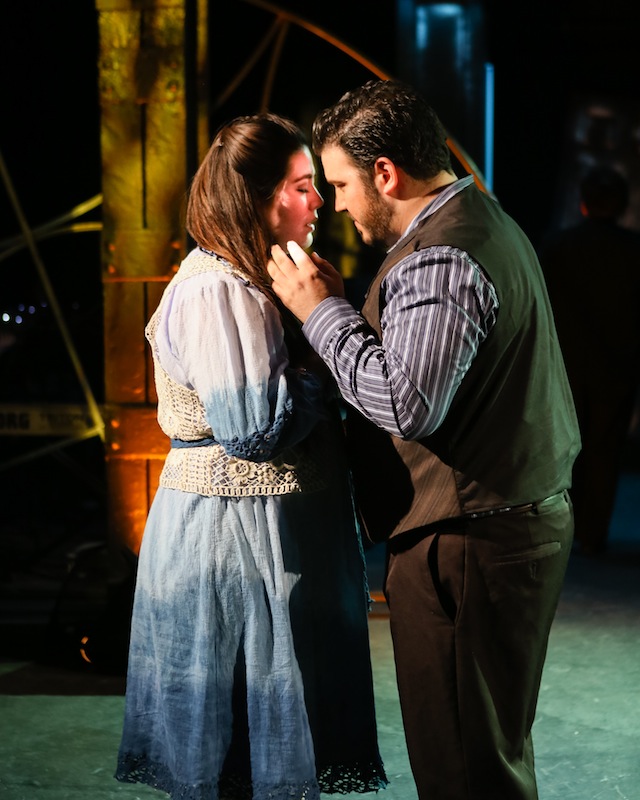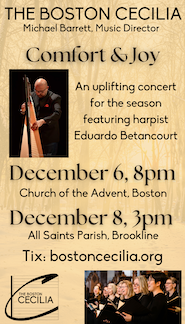Soprano shines brightly in Boston Opera Collaborative’s slenderized “Faust”

Emily Jensen and Salvatore Atti in Boston Opera Collaborative’s “Faust et Marguerite.” Photo: Dan Busler
There was a time when it seemed that opera companies played nothing but Faust.
Gounod’s most popular opera premiered in 1859 and ran to 2,000 performances by 1934. In addition it was performed in forty-five different countries and translated into two-dozen languages.
The work has also proven to be quite elastic in form. It began as an opera comique, a dramatic structure that involved spoken dialogue. But the composer eventually refashioned Faust into the five-act version suited to the grand operas of France. Even then the last two acts were interchangeable.
A new and engrossing version of Faust, presented by Boston Opera Collaborative, opened at the Plaza Theatre Friday night.
Faust et Marguerite is a trim, ninety-minute version of Gounod’s work by Paul Dorgan and Patricia-Maria Weinmann that eliminates some of the secondary characters, as well as all of the wild drinking scenes and lavish sections of the music, such as the Walpurgisnacht ballet. But the reduced score maintains many of the key arias, such as Marguerite’s jewel song, “Ah, je ris de me voir.”
The streamlined story, which unfolds in a Prologue and two Acts, packs the same dramatic punch of the original. An aged Faust enters into a bargain with Mephistopheles to be made young again in exchange for his soul. In addition, the devil’s servant agrees to help Faust seduce the lovely Marguerite. Faust succeeds, yet abandons Marguerite along his road of debauchery, leaving her pregnant and attended by her only friend, Siebel. Faust eventually returns and as Mephistopheles attempts to collect Marguerite’s soul, the woman offers a final prayer, releasing her spirit to heaven, leaving Faust to be forever condemned.
Patricia-Maria Weinmann’s production and Andrea Nice’s sets were beautiful in their shadowy design. The performance space was adorned with black pillars trimmed in grey paint. The scene in the church was simple, yet stark, with scattered lights on the floor to capture the sun through a church window.
The blocking made effective use of the full stage, and the singers were able to move freely in front of and behind the sets while singing without sacrificing volume, a testament to the clean acoustics of Plaza Theatre.
The costumes were also simple and effective, Faust in dark pants and vest and Mephistopheles in a black, open-collar suit. Marguerite had the only costume changes, her blue and white dress increasingly shredded and torn as the opera progressed.
The singers ranged from capable to excellent.
As Faust, Salvatore Atti sang with a ripe tenor voice and did his best to fill out Gounod’s vocal writing. He was most successful in his middle range, which rang with powerful tone. Yet his upper range at times sounded strained, and he had an unfortunate crack in his solo scene in Act 1. His acting, though, caught the character’s lovesickness for Marguerite.
Brian Church found the many sides of the character of Mephistopheles. He was aptly miserly as he coaxed Faust into a life of sin, his baritone bright and bell-toned. His best performance came in the church scene of Act 2, where his singing and devilish presence were captivating.
In the small role of Siebel, Krista Marie Laskowski sang with a flowering, darkly rich soprano voice.
But it was Emily Jensen, as Marguerite, who was the vocal star of the show. She sang with a vocal tone that was warm and supple in her low register and an upper range that managed to blossom fully through the score’s powerful crescendos. Her performance of the jewel song was charming and witty; her final prayer was heart-rending.
For this performance, Gounod’s richly melodic score was condensed to a piano with string quartet, with music director Nicholas Place leading from the keyboard. The ensemble rendered the music with energy, shaping the phrases with sensitive rubato. The intonation, however, was disappointing, the strings wandering in and out of tune with the piano for much of the evening.
Faust et Marguerite runs through January 23 at the Boston Center for the Arts’ Plaza Theatre. bostonoperacollaborative.org.
Posted in Performances

